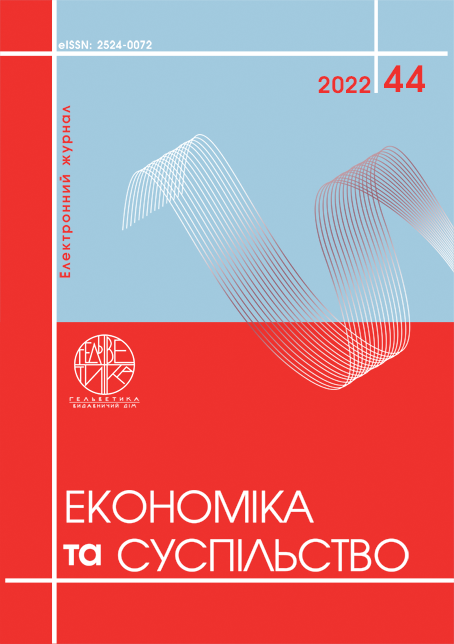DEVELOPMENT OF ECONOMIC-THEORETICAL KNOWLEDGE IN NONLINEAR DIMENSIONS OF SYNERGY
Abstract
The objective need for radical transformations of complex economic systems and the development of modern tools for analyzing the underlying mechanisms of socio-economic changes requires a review of the methodological foundations of the traditional scientific knowledge. Rethinking of the content and role of existing methods of studying the fundamental concepts of traditional economic theory proves the relevance of the article. The purpose of the article is to develop innovative types of methodological reflections that open up new possibilities for the theoretical development of economic knowledge. The methodological basis of the article comprise methods and forms of research tested in economic science, such as a synergetic and systemic approach, the principle of co-evolution, methods of comparison, analysis and synthesis, methods of abstraction, historical and logical evaluation, empirical and theoretical knowledge. The article reveals the features of economic-theoretical knowledge and stresses the dominant role of the synergetic method in the process of economic-theoretical knowledge. The authors confirm that the key aspect of the synergetic methodology is “nonlinear thinking”, which is represented by multi-variant and alternative evolution, and that the synergetic approach does not cancel the existing theoretical models of economic science and the corresponding categorical apparatus, but adjusts their development taking into account the new economic reality.
References
Fiuke R., Bettle J. (1996) Chaotic Coguation: Principles and Applications – N.Y.: Lawrence Erlbanm Associates, 1996. – 183 p.
Ananyin O.I. (2005) Struktura ekonomiko-teoreticheskogo znaniya: Metodologicheskiy analiz [The structure of economic-theoretical knowledge: methodological analysis: monograph]. Moscow: Nauka. (in Russian)
Arshinov V.I., Kiyashchenko L.P., Tishchenko P.D. (2002) Vopros o «chelovekernosti» i transformatsii nauki [The Question of «Human Dimension» and the Transformation of Science]. Filosofiya nauki – Philosophy of Science, vol. 8, p. 3–13.
Bazylevych V.D., Ilyin V.V. (2007) Metafizyka ekonomiky [Metaphysics of economics: monograph]. Kyiv: Znannya. (in Ukrainian)
Gaidai T.V. (2008) Paradyhma instytutsionalizmu: metodolohichnyi kontekst: Monohrafiia [Paradigm of institutionalism: methodological context: monograph]. Kyiv: Kyivskyi universytet. (in Ukrainian)
Galchinskiy A.S. (2010) Ekonomíchna metodologíya. Logíka onovlennya [Economic methodology. The logic of updating: monograph]. Kyiv: ADEF-Ukraina (in Ukrainian)
Yevstigneyeva L.P. (2010) Ekonomika kak sinergeticheskaya sistema [Economy as a synergetic system: monograph]. Moscow: LENAND. (in Russian)
Momeni F., Elahi N., Najafi S.M.S. (2017) Appropriate theoretical framework for understanding and analyzing economic issues in knowledge-based economy. Journal of the Knowledge Economy, Vol. 8, No. 3, pp. 957–976.
Knyazeva Ye.N. (2009) Balansirovaniye na krayu khaosa kak sposob tvorcheskogo obnovleniya [Balancing on the edge of chaos as a way of creative updates]. Sinergeticheskaya paradigma. Chelovek I obshchestvo v usloviyakh nestabil’nosti [Synergetic paradigm. Individual and society in the conditions of instability]. Moscow: Progress-traditsiya. (in Russian)
Kronover R.M. (2000) Fraktaly i khaos v dinamicheskikh sistemakh. Osnovy teorii [Fractals and chaos in dynamical systems. Basics of the theory: monograph]. Moscow: Postmarket. (in Russian)
Skotnyi P.V. (2011) Ekonomichna synerhetyka: teoretyko-metodolohichnyi analiz [Economic synergy: theoretical and methodological analysis: monograph]. Drohobych: Redaktsiino-vydavnychyi viddil Drohobytskoho derzhavnoho pedahohichnoho universytetu im. Ivana Franka. (in Ukrainian)
Skotnyi P.V. (2011) Ekonomiko-teoretychne znannia v paradyhmi metodolohii [Economic and theoretical knowledge in the methodology paradigm: monograph]. Drohobych: Redaktsiino-vydavnychyi viddil Drohobytskoho derzhavnoho pedahohichnoho universytetu im. Ivana Franka. (in Ukrainian)
Mochernyi V.S. (2001) Metodolohiia ekonomichnoho doslidzhennia [Methodology of economic research: monograph]. Lviv: Svit. (in Ukrainian)
Prigozhin I. (2008) Poriadok iz khaosa. Novyi dyaloh cheloveka s pryrodoi [Order out of chaos. A new dialogue between man and nature: monograph]. Moscow: UPSS. (in Russian)
Prytkov V.P. (2001) Opravdaniye sinergetiki [The justification for synergy]. Voprosy filosofii – Philosophical questions, vol. 4, p. 146–150.
Tarasevych V.M. (2014) Ekonomiko-teoreticheskiye znaniya: budova, struktura i filosofiya v nauke [Economic and theoretical knowledge: structure and genesis in the philosophical and scientific dimension]. Ekonomíka Ukrainy – Ukraine's economy, vol. 2 (627), p. 29–50.
Haken H. (1994) Can Synergetics Serve as a Bridge Between the Natural and Social Sciences? In: Mishra R.K., Maaß D., Zwierlein E. (eds) On Self-Organization. Springer Series in Synergetics, vol 61. Springer, Berlin, Heidelberg.
Haken H. (2004) Synergetics: Introduction and Advanced Topics. 10.1007/978-3-662-10184-1.
Andersson Å.E. (1995) Economic Network Synergetics. In: Batten D., Casti J., Thord R. (eds) Networks in Action. Springer, Berlin, Heidelberg.
Medio A. (1984) Synergetics and Dynamic Economic Models. In: Goodwin R.M., Krüger M., Vercelli A. (eds) Nonlinear Models of Fluctuating Growth. Lecture Notes in Economics and Mathematical Systems, vol. 228. Springer, Berlin, Heidelberg.
Grazhevska N.I. (2008) Upravlinnia skladnymy sotsialno-ekonomichnymy systemamy v konteksti synerhetychnoi paradyhmy [Management of complex socio-economic systems in the context of the synergistic paradigm]. Vishcha shkola – High school, vol. 3, p. 62–70.


